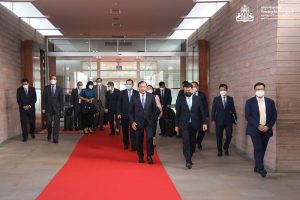Cambodian Foreign Minister Prak Sokhonn, the current special envoy of the Association of Southeast Asian Nations (ASEAN), departed this morning for a three-day visit to Myanmar, his first official mission to the country.
In a statement released on Friday, Cambodia’s Foreign Ministry said that Prak Sokhonn will lead a delegation including Lim Jock Hoi, Secretary-General of ASEAN, Lee Yam Ming, executive director of the ASEAN Coordinating Centre for Humanitarian Assistance (the AHA Center), and Cambodian Ministry of Industry Cham Prasidh.
According to the statement, the visit “will be aimed at creating a favorable condition leading to the end of violence,” and encouraging “political consultations/dialogues among all parties concerned.” Prak Sokhonn will also discuss the distribution of humanitarian assistance via the AHA Center.
All three of these goals are part of ASEAN’s Five-Point Consensus peace plan, which it agreed upon at a special summit last April. The Consensus aims to a achieve “an immediate cessation of violence in Myanmar” and open the way to a peaceful solution involving “all parties,” after the coup plunged the country into renewed conflict and devastated its economy.
Expectations for the mission should be tempered. Despite signing off on the Five-Point Consensus, the military junta has dragged its feet on its implementation, redoubling its efforts to quash the rising armed resistance to its rule. It has shown similarly that it only plans to engage with the special envoy on its own terms.
The State Administration Council (SAC), as the junta euphemizes itself, last month rejected Prak Sokhonn’s request for access to leading members of the National Unity Government (NUG), which was set up last year by members of the ousted National League for Democracy (NLD) administration that the military overthrew in February 2021. While Prak Sokhonn’s request was well within the terms of the Five-Point Consensus, the military government said it would not permit him to engage with “unlawful associations and terrorist groups” that were “perpetrating violence.”
For its own part, the NUG and its various allies are similarly unwilling to sit down with the hated military administration. Indeed, for many the struggle to reverse the February 2021 coup has evolved into a revolutionary project: a sort of Morgenthau Plan aimed at subordinating the military to civilian control and permanently reducing its ability to play an important political and economic role in Myanmar.
In this sense, the situation in Myanmar bears some resemblance to the peace talks that are currently failing to make much headway in the war between Ukraine and Russia. At its heart, a political settlement to a conflict can only progress when the two contending parties feel that they have less to gain on the battlefield than at the negotiating table.
In this context, the goal of Sokhonn’s mission should be to open up a pathway by which some sort of negotiations might be able to begin, once the two sides feel that they can no longer achieve their goals by force of arms. However, when this might occur, even 14 months after the coup, remains difficult to determine.













